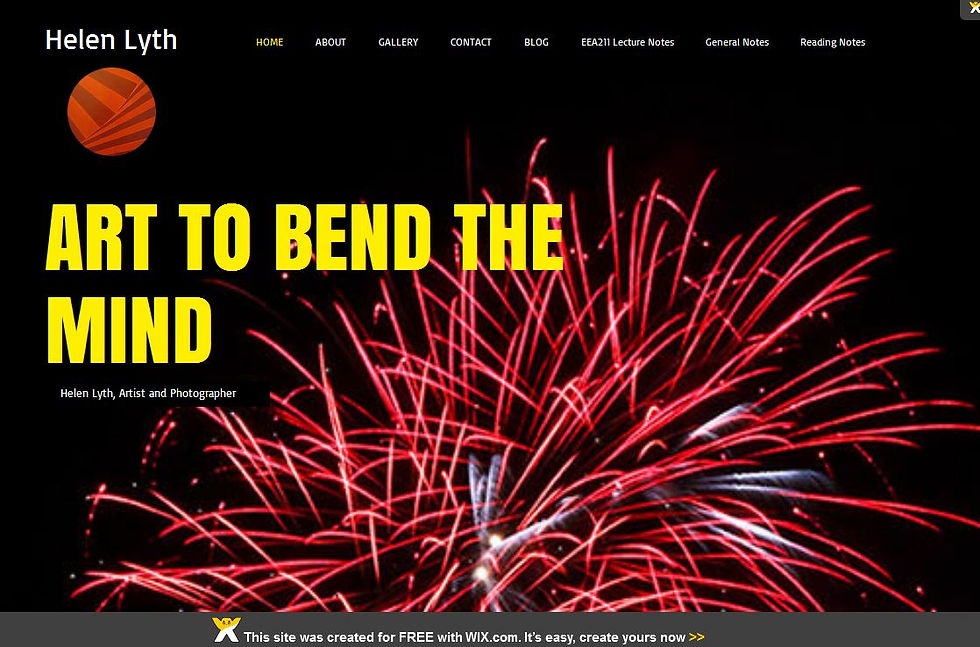WIX versus Wordpress
- hlyth3
- Jun 7, 2015
- 3 min read
I bit the bullet for EEA211 Navigating the Visual World and explored Wix as the host for my online journal.
I had a brief dabble with Wix once before, but opted for Wordpress as it seemed more comprehensive.
I not have a number of Wordpress sites, manage a couple more, and have designed one for the local angling club, so I have a fair grasp on the program.
Wordpress and Wix both allow:
multiple pages
multiple templates
a number of ways to add information
the ability to add documents, pictures and video (free for You Tube, for a fee to upload directly)
customised colours and backgrounds

Advantages of Wix
all images in one place regardless of how many sites you have (images can be put into folders)
ability to change font size easily
very easy to use for a new user
Choice of page styles - e.g. gallery, text
Links open in a new window by default.
Editing of pages is WYSIWYG - so you can see the result as you edit.
Drawbacks of Wix
Slow to load sites, slow to load editing tools
no spell check!
text is small font by default, with no space between paragraphs. Looks crowded and uninviting.
Very limited editing tools
no history to revert to a previous version if you lose work etc.
a limited number of menu items on the top of the page - the rest all come in under 'more'
difficult to add, find and edit blog posts.
Difficult navigation, and options quite limited.
Saving takes two steps - one to save draft, another to make live. Also extra, unwanted pop-ups with messages and social media inclusions.
Does not carry formatting from copied word document, or support tables.
Formatting posts difficult - menu not always accessbile.
Links need to be added manually.
some features (e.g. tailoring colours and fonts) only available with premium upgrade
Images tend to move around the page - after saving - leading to lost time fixing
Very easy to delete information - without realising it
Cannot add a picture from URL

Advantages of Wordpress
a separate allocation of data (3gigabytes for free sites) for each site you manage
pictures are separate for each site - but can be a drawback if you want to use the same picture in several places
All media - pictures, documents, video etc. on one place, easily accessed with one button while editing.
more flexible - e.g. you have access to html code if you wish to use it
multiple places to put extra information on the one page - via widgets on side bar, header, footer.
more intuitive for beginning users, and more comprehensive for the more advanced, up to relatively easy tailoring of templates to own use, and devising new ones.
No hard sell to upgrade.
Options to add contact forms etc. to pages e.g. The Choral Grapevine Calendar has a form for visitors to add items to the calendar.
Security features for some operations (via a security code on a mobile phone)
Ability to invite multiple users at various levels - e.g. editor, administrator
Reasonably comprehensive set of editing tools.
Carries over some formating from word processed documents - including tables.
Easy switch from visual to html editor.
Statistics available on site usage etc.
A comprehensive dashboard
Featured headers available for posts and pages.
web address (without Wordpress) available for about $20 annually. e.g. http://geelongbybike.com/ and http://cyclinggeelong.com.au/
Links added automatically when copied from word processor.
Comprehensive support network for users' problems.
Photos can be added from elsewhere on the internet.
Drawbacks of Wordpress
some features (e.g. tailoring colours and fonts) only available with premium upgrade
links open in same window by default - which means visitors are taken away from the site.
Some features need more expertise (but there are helpful tutorials, and help sites)
Pages are edited from the dashboard - you can't see the 'live' page till you preview.




















Comments